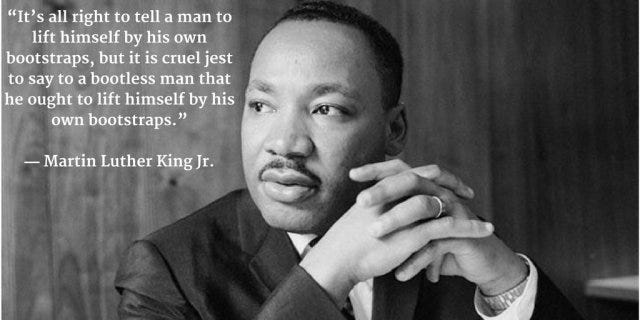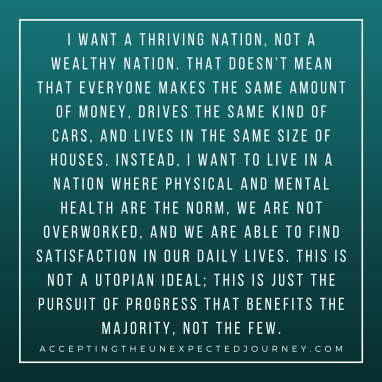Surviving Isn't Thriving
Whether or not our fellow citizens can survive shouldn't be our ultimate goal

In Embracing Curiosity, I step away from writing about travel to comment on the bigger journey of life, exploring my faith and politics with curiosity and nuance.
It felt like our lives were coming apart at the seams.
Five months before, we had left our home in Indianapolis and moved two hours northeast to Fort Wayne. Our house in Indy still sat empty and unsold. We had bought a disaster of a foreclosure that had a lot of potential but also required a lot of money to meet that potential. Unable to find a job right away, I had instead decided to start graduate school and work as a graduate teaching assistant, a position that paid for my tuition, daycare three days a week for our toddler daughter, and covered our monthly car payment. Shortly after I started school, we discovered that I was pregnant with our second child and I was quickly becoming a physical and emotional mess. For the first time in our lives we had to pay extra for health insurance for myself and our daughter because I didn’t have an employer to cover it and with a toddler and a pregnancy we couldn’t do without it. When it got cold in late October we finally turned on our furnace only to discover that the same issue that had fried our AC over the summer had also destroyed our furnace, so now we had to spend money we didn’t have to replace our second HVAC system in a year. (We had to do the same for our house in Indianapolis the previous winter.) The day after hosting both sets of parents for Thanksgiving, our water well went out and we went several days without water while we waiting for the first business who returned our phone call to do a poor job replacing our pump. By the time December rolled around, I had canceled our auto-payment on our Indy house because we could no longer swing two payments. We would just have to deal with the massive hit to our credit rating until we could finally find someone to rent the house that had become an albatross around our necks.
Clearly, we were not thriving.
I look back on that two to three-year period as a blur with significant moments that stand out. People have asked how I managed to do it all (grad school, teaching, home renovation, toddler, infant) and I have no idea. I just did it because we didn’t have a choice. Graduate school wasn’t just a long-time dream; it was necessary for where I saw my life moving forward. Teaching was my vocation and very much a part of who I was (and am). Home renovation wasn’t an option if we wanted a clean, livable place for our family. And once you commit to parenthood, you are committed. Our daughter and son needed their mom and I did everything I could to be as present as possible, even if I was falling asleep while breastfeeding our insatiable infant son in the middle of the night, praying I would make it through the next day of teaching or classes without falling asleep at my desk or on top of my laptop.
When I’m being honest about that two to three-year period, most of the time we were in pure survival mode. I was trying to keep our bills paid while we were bleeding money into our project house. I was emotionally distant because I often felt isolated and friendless. I was exhausted because I was always working or parenting or trying to squeeze just a couple more minutes of sleep out of my morning alarm.
Dreaming about the future was out of the question because I was just trying to make it to the end of the day. Dating my husband was out of the question because how would we pay for both a babysitter and the date? When we were finally on firmer ground and my husband suggested that we buy a camper so we could get back into camping, my initial resistance stemmed from three years of uncertainty and survival mode. I wasn’t ready to think about a life of thriving with my family because I was still thinking about all it took for us to survive.
It’s a personal lesson that I take with me when I look at friends and family who are in the midst of their own struggles, and when I look at our country right now.
Far too many of us are stuck in a survival mode that keeps us from thriving as individuals and as a nation.
And I’m also cognizant of the fact that our experience paled in comparison to those of many others around me.
When both members of a couple are working full-time jobs and they still struggle to put food on the table and keep a safe roof over their children’s heads, no one in the household is thriving.
When a family’s financial situation is permanently decimated because one or more members has a chronic health condition, no one in the household is thriving.
When a family cannot afford to move out of their neighborhood and the children are forced to attend unsafe and ill-equipped schools, chances are the children and their children will not thrive in the future.
When a person’s mental health needs are not cared for, chances are the resulting medical needs, abuse, and drug use and misuse will not just prevent them from thriving, but also many of the people in their closest circle.
When the world is falling apart for a single person, it is not just that person who is affected. It is nearly everyone that person is closely connected to. A goal of thriving depends on understanding the concept that “it takes a village” and that we are all connected. It also recognizes, like Martin Luther King, Jr. pointed out, that sometimes people need a helping hand to get out a state of pure survival.
In another variation of that idea, in his book Born a Crime, Trevor Noah recounts the break that he got as a hidden biracial kid in apartheid South Africa; a friend gave him a computer, which allowed him to learn many of the skills that helped him develop a career that eventually landed him on The Daily Show. He says, “People love to say, ‘Give a man a fish, and he’ll eat for a day. Teach a man to fish, and he’ll eat for a lifetime.’ What they don’t say is, ‘And it would be nice if you gave him a fishing rod.’ That’s the part of the analogy that’s missing.” If people don’t have access to the tools necessary to thrive, they will never get there.
It is not socialism to expect that an employer should not be allowed to flourish while his or her employees struggle to cover their basic needs. It’s not socialism to insist that our infrastructure be designed for equity in opportunity. It’s not socialism to believe that every citizen needs access to quality education and affordable healthcare for a fully functioning and thriving society.
What are the benefits of a thriving populace?
When pregnant mothers can get the health care that they need throughout their pregnancies and post-partum, they have healthier babies who are better prepared for school by the time they are in kindergarten.
When children aren’t worried about safety or basic needs, they can do better in school, which leads to a better-educated citizenry.
When teenagers see multiple paths to post-secondary education so they can pursue the career of their choice, we start building a stronger, skilled workforce.
When mothers and fathers can provide for their households by only working 40 hours a week and can do so with the assurance that their children are in a safe, nurturing environment, our homes become nurturing and safe places that develop emotionally and physically healthy families.
When workers don’t have to depend on their employer for quality, affordable health insurance and retirement plans, they have the freedom to pursue their passions, take more creative risks, and innovate, which can transform our economic ecosystem.
In short, a thriving society doesn’t just benefit the individual, it benefits all of us.
We shouldn’t have to go through our own personal dark periods to come to the conclusion that we would all be better off if we focused on ensuring that every American has the chance to thrive, but experience is a strong developer of empathy. Any time I hear people complain about the push for higher minimum wages, changes in our health care system, improving our transportation infrastructure, reforming our education system, and so many more issues, I think back to that singular period of our lives, when it seemed like we would never get out of the pit we found ourselves in.
I want a thriving nation, not a wealthy nation. That doesn’t mean that everyone makes the same amount of money, drives the same kind of cars, and lives in the same size of houses. Instead, I want to live in a nation where physical and mental health are the norm, we are not overworked, and we are able to find satisfaction in our daily lives. This is not a utopian ideal; this is just the pursuit of progress that benefits the majority, not the few.
Is that really too much to ask?
Please “like” by clicking on the ❤ and share this post with your friends so that others can also join the journey.



